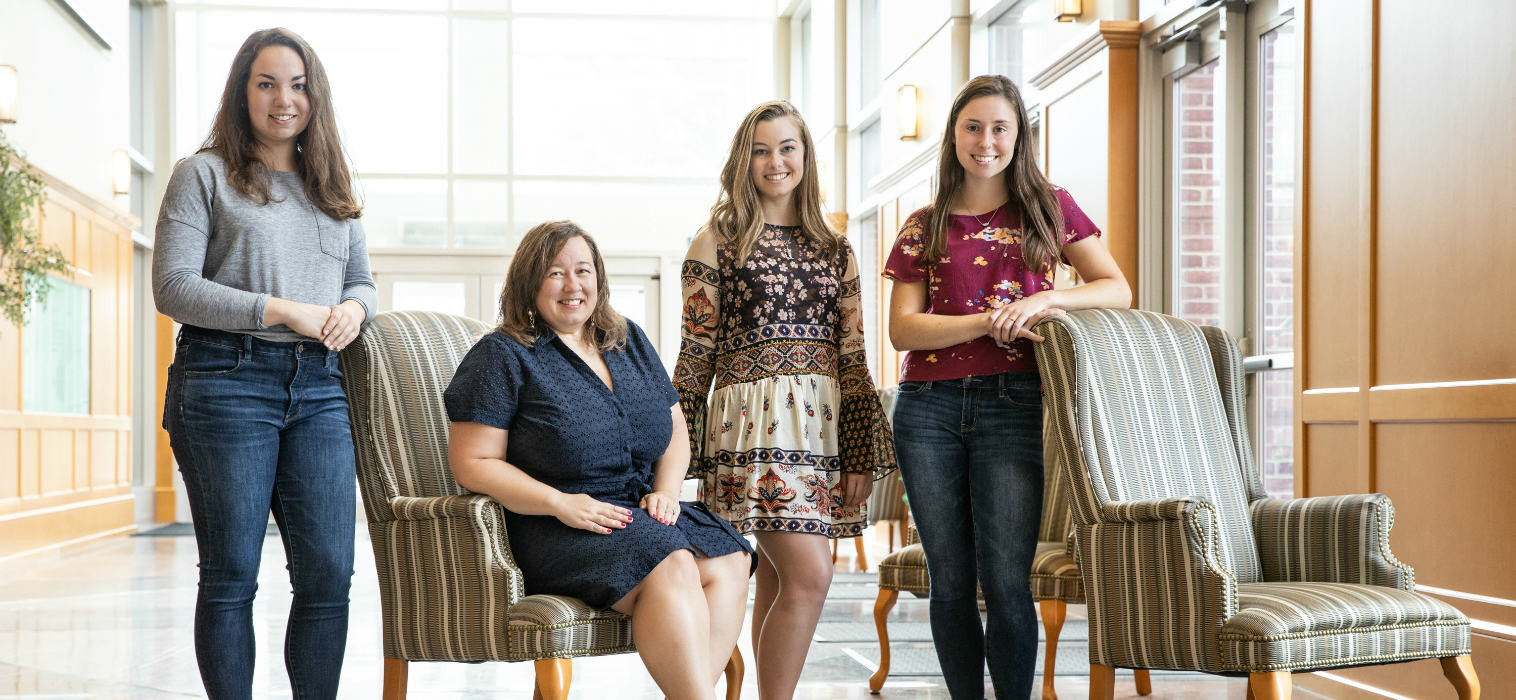Amy Howard (seated) visits with former Kutztown Area High School students who now attend Moravian (from left to right): Michaela Ryan ’21, Krista Kunkle ’20, and Rachael McCoach ’22.
An alum reflects
Your Story
Finding My Calling
By Amy Kohler Howard ’95
Photograph by Peter Keady
When my mom and I visited Moravian College on a beautiful fall day in 1990, we immediately knew this would be my next home, even though it was our first college visit. The product of a small high school in Berks County, I found large universities impersonal and confining. Moravian’s liberal arts philosophy, community, and deep-rooted traditions were not marketing hype but genuine attributes of the school. A Comenius Scholarship coupled with the Timothy Breidegam Memorial Scholarship Fund made Moravian a financial reality. What I didn’t know was that my life would circle back to Moravian more than once.
I arrived at Moravian’s gates naïve in many ways, but I grew through my experiences. I developed deep friendships with people from different backgrounds, explored new disciplines, and cultivated a more informed worldview. Enrolled in the broad-based core curriculum, I was exposed to professors and academic disciplines I might not have considered otherwise. The differing points of view and discourse were intellectually stimulating. Suddenly, I was my 4-year-old self, prolifically generating questions.
The Moravian professors who challenged me are too numerous to acknowledge. Dr. Glew, my freshman adviser, remains one of the kindest, most genuine souls I have ever met. He helped me secure a work-study position in the history department, where Dr. Keim and I frequently fell into philosophical conversations about politics and current events.
“As a first-generation student, attending college was as much my parents’ dream as it was mine.”
I had come to Moravian certain I wanted to practice law, and I envisioned my future as a child advocate. Then as it came time to complete law school applications, Dr. Keim suggested I consider pursuing a PhD in psychology. My focused 21-year-old self laughed and dismissed the idea. I also noticed subtle signs that Dr. Toedter and Dr. Dunn, my mentors in the psychology department, were not convinced of my interest in law, but they respected my enthusiasm and commitment, knowing I needed to find my own way.
As I prepared for Villanova Law, political science professor Dr. Reynolds warned this would be very different from my educational experience at Moravian, with different goals and purposes associated with professional training. Despite the warning, I was jolted by the contrast, and I believe that jolt subconsciously triggered the birth of my teaching philosophy. In the end, law school proved to be less about my legal training and more about my training as an educator.
After graduating, I joined a midsize commercial law firm focused on non-profit and healthcare law. The aspiration of becoming a child advocate had long disappeared after a professor discouraged that path for financial and personal reasons. Two years into my career, I was $75,000 in debt and adrift.
Trying to fill a void, I started volunteering with at-risk girls at Raub Middle School in Allentown. I took a position as a healthcare compliance attorney, convincing myself I just needed a change in environment. Still, my unhappiness grew, and I realized it was more than the typical angst associated with paying one’s dues in the early years of a career. In my gut, I knew I was never going to find my calling in law, but I had lost trust in my inner voice and questioned every aspect of my life. Despite methodical planning and preparation, I was 30 and having a full-blown midlife crisis.
“I found my calling because, since infancy, many people, from family to strangers, made an investment.”
The last time I remembered feeling balanced was at Moravian. The more I contemplated long-term goals and priorities, the more I knew I had to make a dramatic change. I told my husband and family that I was going back to Moravian to become a high school teacher. They were supportive but skeptical, and my parents were concerned I was just going to be a lifelong student.
Commuting more than an hour, I returned to Moravian’s campus as a full-time nontraditional day student. It was a very different experience the second time around, but it was the perfect place for me to shift directions. I found my path under the guidance of Dr. Mayer, and the focus on reflective practices prepared me for the complexities of teaching.
For 15 years now, I have taught US history and psychology at Kutztown Area High School, my alma mater. My 18-year-old self would have been horrified to know the future me would spend 8 to 10 hours a day in my former language arts classroom. Returning to Kutztown was definitely not how I would have defined success.
My students know that I wake up every day wanting to go to work. While public education has its frustrations, I am precisely where I was meant to be, even if the path wasn’t direct. I found my calling because, since infancy, many people, from family to strangers, made an investment in me, either in time or funding. Adolescents watch and note our actions. So I hope I challenge my students to use critical thinking and effective communication to find their path and develop a sense of civic responsibility. And I hope my actions inspire them to be philanthropic, generous community-builders who contribute to someone else finding his or her calling.

